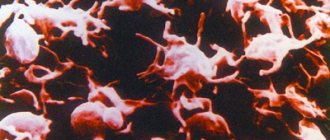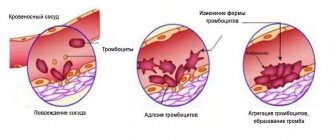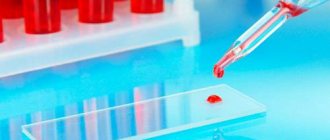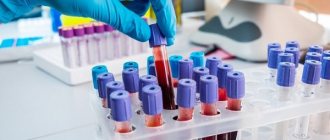What does total blood protein mean during pregnancy?
Proteins (aka proteins) are the most important macronutrient for good health. Approximately 20% of the living tissues of the human body consists of proteins, which serve as the basis for the formation of cells. Proteins are the main structural unit of all enzymes and form the basis of most hormones.
The term “total blood protein” means the totality of all blood serum proteins. Insufficient concentration of this indicator indicates certain disorders in the body. True, there is also natural hypoproteinemia, which is not at all dangerous to health - this condition is typical for small children, women in late pregnancy and nursing mothers.
Functions of protein in the body of a pregnant woman
The importance of protein for humans, and especially for the health of pregnant women, cannot be overestimated. To verify this, look at what important functions these substances perform during gestation:
- take part in the creation of immune status;
- ensure the delivery of vital nutrients to all corners of the body;
- are responsible for accumulating reserves for breastfeeding after childbirth;
- participate in creating favorable conditions for the formation of a child’s place and fetal development;
- prepare the mammary glands for the upcoming feeding and ensure normal functioning of the uterus;
- control and maintain within normal limits the ability of blood to clot;
- maintain osmotic pressure at an optimal level, which prevents blood thickening and the development of extensive edema.
Considering how much of the body's activity is controlled by proteins, doctors regularly monitor their concentrations in the blood. Low total protein during pregnancy can have negative consequences not only for the woman, but also for her baby.
How to normalize protein
To avoid the adverse consequences of protein deficiency, it is necessary to contact a specialist in a timely manner, and do not miss scheduled laboratory tests and routine examinations with an obstetrician-gynecologist. Usually, competent diet therapy is sufficient to normalize protein concentration in the bloodstream.
Recommendations for normalizing protein are based on the mandatory diversity of the maternal diet. A pregnant woman's daily menu must include animal and dairy products, fruits, herbs and fresh vegetables. You need to drink at least one and a half liters of water per day, and eat 4-5 times a day.
If protein deficiency is of pathological origin, then drug intervention will be required. The prescription of specific drugs depends on the underlying cause of hypoproteinemia. Only after neutralizing the root cause of protein deficiency can the protein balance be normalized. There is no universal treatment; drugs are selected individually. The main condition for prescribing drug therapy is the use of drugs from the safest category for pregnant women.
Protein is a vital component for fetal development during gestation. To avoid deviations from the norm, pregnant women are advised to regularly consume protein foods (but in moderation), and if necessary, if correction of protein levels is required, strictly follow medical recommendations.
When to donate blood for protein during pregnancy
During pregnancy, a woman donates blood several times for biochemical analysis. As part of the study, the concentration of total protein in the blood is also determined. For this purpose, biological material is collected:
- when a woman applies to a housing complex to register;
- in the period 24 - 28 weeks;
- in the period 32 - 36 weeks.
This schedule is designed for expectant mothers whose pregnancy is developing satisfactorily. If certain abnormalities are detected in a woman’s condition, blood will need to be tested more often. Here are the deviations we are talking about:
- formations of benign or malignant etiology;
- any type of liver and kidney dysfunction;
- acute and indolent infections;
- systemic pathologies.
Why is it rejected?
Protein deficiency during pregnancy is quite common. The reasons leading to a decrease in protein in the blood are:
- frequent stress and nervous strain. In this case, an increased consumption of proteins and carbohydrates occurs in the body; it is the reserves of the former that are difficult to restore;
- liver pathologies, in which the synthesis of protein compounds deteriorates;
- diseases of the gastrointestinal tract;
- thermal burns, which entail the breakdown of proteins in the body;
- poor nutrition, due to which the body receives insufficient amounts of protein;
- poisoning;
- pathologies of the kidneys and thyroid gland;
- severe blood loss.
Often a deficiency occurs after surgery or injury.
Very often, hypoproteinemia is observed in women with severe toxicosis. During multiple pregnancy, the load on the body increases several times, and the cost of proteins and other nutrients also increases. Therefore, women expecting twins or triplets often experience low protein. The main symptoms of low protein are:
- severe swelling (associated with low osmotic pressure in the bloodstream);
- increased blood pressure due to decreased blood volume and narrowing of blood vessels;
- headache;
- night cramps;
- weak weight gain.
If one of these signs is detected, it is recommended to make an emergency visit to the doctor and, if necessary, donate blood for analysis.
How to properly donate blood for protein for biochemical analysis during pregnancy
Blood is donated early in the morning, before breakfast. At least 8 hours must pass since the last meal. During this period, you can only drink, and only water, since the body perceives coffee, tea, compotes and juices as food.
At the manipulation room, the expectant mother should catch her breath and rest for about 10 minutes. Any physical activity and emotional stress distorts the final picture of the study. For the same reason, it is not recommended to donate blood after physiotherapy and massage.
Before drawing blood, the arm is tied with a rubber band slightly above the elbow, although some laboratory assistants prefer not to do this. Biological material is collected from a vein in the fossa of the elbow and collected in test tubes with red caps. When the serum is obtained, the level of total protein is determined using biochemical analyzers. For a number of reasons, the levels of the substance may be falsely elevated: for example, the patient’s arm was tied with a tourniquet for too long, the expectant mother donated blood in a restless mood, or suddenly stood up from a lying position.
Normal blood protein levels during pregnancy
The indicators of total protein and its fractions are a constant value. The numbers, of course, may fluctuate, but these changes are limited within certain limits. The norm of total protein for an adult is acceptable in the range of 65 - 85 g/l. In women, after conception, the concentration of this substance in the blood gradually decreases to 55 - 65 g/l.
A decrease in protein levels in expectant mothers occurs due to progesterone, under the influence of which the volume of circulating blood in the body increases. True, this picture is typical mainly for late pregnancy. Partially, the protein concentration falls due to the high energy costs of the mother’s body to ensure the vital functions and active development of the fetus.
The values of protein fractions in the blood of the expectant mother are also changed: globulin on the eve of childbirth is maximally increased, while albumin levels gradually fall. Doctors judge whether the pregnancy is proceeding normally based on the results of the proteinogram.
Results
Total protein in the blood is an important indicator of the health of a pregnant woman and her unborn child. When hypoproteinemia is detected in a woman, the unborn baby does not receive adequate nutrition and oxygen supply. The consequences of protein starvation can be delayed mental and physical development of the fetus, premature or complicated delivery, and hypoxia of the baby during childbirth.
The protein norm for pregnant women is 56–85 g/l. The indicator is determined during a biochemical blood test. If the indicators drop critically, below 55 g/l, the woman is at risk of developing gestosis (severe late toxicosis).
A decrease in protein levels can be caused by poor nutrition or the presence of chronic diseases. The main method of normalizing protein levels is to correct the pregnant woman’s diet.
In 9 months, a pregnant woman manages to undergo an innumerable number of tests. Mandatory studies also include blood biochemistry, which is an excellent indicator of the course of pregnancy. Protein is a clear indicator, because deviations from the norm help to notice latent pathology in a timely manner. If tests show low protein in the blood during pregnancy, it means that the woman is experiencing protein deficiency, which is not good for the child.
Low protein levels during pregnancy: what is the reason?
The condition when the concentration of protein components in the blood is reduced is called hypoproteinemia. Such changes can be caused by both harmless reasons and preconditions for quite serious pathologies.
Typically, protein levels drop due to a lack of iron in the body and weakened general immunity, due to diseases of the digestive system, liver and kidneys, as well as due to severe toxicosis, poor nutrition or serious injuries. Many factors pose a real danger to the health of the mother and her child, therefore, if the total protein deviates from the norm, a comprehensive examination is indicated, thanks to which all dangerous factors will be neutralized in a timely manner.
There are quite a few provoking factors for the formation of protein deficiency in the blood of the expectant mother. Most often, this condition develops due to a woman’s poor appetite when she eats few foods containing protein. Hunger is usually reduced by nausea and vomiting, poor family relationships, stress, or depressive thoughts.
Also, a pregnant woman’s body does not receive enough important protein elements when she does not eat properly and prefers foods with a low protein content. It happens that hypoproteinemia is caused by excessive protein consumption in kidney diseases. And liver dysfunction can generally interfere with the formation of certain protein complexes. In addition, the supply of total protein is to a certain extent affected by gastrointestinal pathologies such as heartburn, toxicosis, and psychological aversion to food.
In the most severe cases, the following diseases cause hypoproteinemia:
- the presence of tumors in the liver;
- hepatitis;
- cirrhosis;
- inflammatory diseases of the pancreas and intestines;
- polyhydramnios;
- glomerulonephritis;
- burns;
- intoxication;
- thyrotoxicosis;
- hereditary factor;
- massive bleeding.
Recovery methods
If protein is reduced for physiological reasons, its restoration ensures a revision of the eating behavior and diet of the expectant mother. Correct diet:
- eating every 3–4 hours (in moderate portions);
- one and a half liters of water daily;
- drinking fermented milk drinks 1–1.5 hours before bedtime.
The daily menu should include foods with high and medium protein content. It is important to take into account the calorie and fat content of dishes. Many protein foods have high energy value; their consumption must be controlled and not overeating.
Fatty foods negatively affect the state of the vascular system and the health of the digestive organs. You should not get carried away with fried foods, pork, lamb, butter, and mayonnaise sauces. The following animal products help increase protein levels:
- Eggs. The protein component of the product is absorbed by 95% (1 chicken egg contains 6 grams of pure protein, calorie content - 78 kcal).
- Turkey and chicken breast. Dietary poultry meat is not fatty and contains few calories (chicken – 130 kcal, turkey – 84 kcal/100 g).
- Lean beef. Protein content per 100 g. The product is 16 grams, plus beef is rich in vitamins B3 and B12, iron, zinc.
- Natural Greek yogurt. Product fat content 2%, calorie content 53 kcal;
- Milk and cottage cheese. In addition to proteins, dairy products will add calcium and phosphorus to the diet to strengthen the baby’s skeletal system.
- Curd cheese. It has less fat content than regular cheese per 100 grams. accounts for 11–13 g. pure protein.
- Fish. The protein value of tuna, mackerel and chum salmon is 22 g/100 g, slightly less in pollock, pike and herring.
- Seafood. Squid and shrimp contain 18 grams. protein.
Signs of Low Protein During Pregnancy
In the absence of a sufficient amount of protein in the body, the following symptomatic picture is observed:
- due to protein deficiency, the expectant mother does not recover; she has an increased hematocrit and hemoglobin. This condition is extremely undesirable during the period when pregnancy is coming to its logical conclusion: this means that the pregnant woman’s blood thickens, and the total protein levels are very low;
- osmotic pressure decreases, which is externally manifested by extensive edema;
- malnutrition develops, due to which the process of intrauterine development of the baby subsequently slows down. This is usually indicated by ultrasound results, as well as measurements of the abdomen and the height of the uterine fundus;
- Due to an increase in the level of liver enzymes, disruptions in its functioning occur. This condition is also caused by a lack of protein elements in the body;
- the volume of circulating blood decreases, which ends with a natural narrowing of blood vessels and an increase in pressure in them. As a result, the expectant mother’s condition worsens due to high blood pressure;
- the lowest possible protein in the blood of a pregnant woman becomes the root cause of the development of such serious disorders as eclampsia and preeclampsia. The clinical picture of this condition is not the most pleasant: the expectant mother develops visual disturbances, hyperactivity of reflex origin, convulsions and severe headaches. In such a situation, we are already talking about saving the child: in order for the pregnancy to continue to develop, the woman is recommended to go to the hospital.
The main reasons for the decrease in level
Hypoproteinemia (low levels of protein in the blood) in pregnant women can occur for a number of pathological and physiological reasons. The first category includes:
- inflammation of the tubular system of the renal apparatus, damage to the glomeruli (glomeruli of the kidneys), otherwise glomerulonephritis;
- chronic inflammatory diseases of the gastrointestinal tract (pancreatitis, enteritis, malabsorption, duodenitis, etc.);
- liver pathologies (hepatitis, cirrhosis, tumor);
- pulmonary insufficiency with accumulation of fluid in the alveoli (pulmonary edema);
- increased synthesis of thyroid hormones (hyperthyroidism);
- excess amniotic fluid (polyhydramnios);
- weakening of the body's defenses (immunodeficiency);
- overhydration (excessive fluid content in the body);
- diabetes;
- food poisoning accompanied by diarrhea and vomiting;
- various mechanical damage (trauma), excessive blood loss, burns.
The physiological causes of a decrease in the level of proteins in the blood (alimentary hypoproteinemia) are due to eating behavior that is not appropriate for the woman’s position:
- starvation;
- incorrect diets;
- vegetarianism (veganism).
With an incorrectly formulated diet, the expectant mother does not receive enough protein products. Amino acid deficiency does not allow the body to synthesize its own proteins for the full development of gestation. And the loss of proteins is also influenced by the nature of pregnancy (toxicosis, gestosis).
An important factor is the psycho-emotional state of the pregnant woman. When distressed (a state of chronic nervous tension), a woman loses her appetite, and in some cases a feeling of aversion to food may occur.
What are the dangers of low protein during pregnancy?
Laboratory tests detect low levels of protein in the blood if a pregnant woman is malnourished or undernourished. At the same time, her body is deficient in more than just one protein—it also lacks calcium, magnesium, iron and many vitamins.
Maternal hypoproteinemia has a great impact on the quality of development and viability of the fetus. The most common consequences of this pathological condition for the baby are as follows:
- intrauterine growth retardation, which is complicated by a wide range of concomitant diseases;
- lack of immunity to pathogens of infectious diseases;
- prematurity;
- congenital anomalies and deformities;
- general weakness.
Women with a low level of total protein in the blood cannot breastfeed for a long time, even if they want to - the mammary glands are able to produce milk no longer than 3 - 3.5 months after childbirth. As a result, the baby is forced to grow up on artificial formula.
Low total protein in the blood significantly complicates the course of pregnancy, even if the woman is generally healthy. Most often, expectant mothers have to put up with the following pathologies:
- acute anemia;
- chronic fetoplacental insufficiency;
- late toxicosis;
- high probability of spontaneous abortion;
- asphyxia of the newborn.
Hypoproteinemia also affects the course of labor. The process of bringing a baby into the world can be overshadowed by the following complications:
- birth canal injuries;
- premature rupture of amniotic fluid;
- slow dilation of the cervix, fading contractions.
Mothers with low protein in the blood rarely give birth to strong babies - the average weight of babies is usually 2700 - 2900 g.
Timely correction of a woman’s diet will help partially reduce the risk of complications during pregnancy.
Risks to the fetus when protein deviates from the norm
A decrease or increase in the indicator entails serious consequences for the fetus:
- intrauterine development disorder;
- fetoplacentral insufficiency;
- hypoxia;
- lack of nutrients;
- intrauterine death.
What to do if protein is below normal during pregnancy
Statistics show that expectant mothers are most often forced to solve the problem of low rather than increased protein during pregnancy. There are several effective ways to normalize protein metabolism in the body. Treatment begins with a complete examination of the pregnant woman, identifying the provoking factor of hypoproteinemia and its elimination. Without this part, any therapy will not be effective.
In most cases, it is possible to return protein levels to normal levels with the help of a properly formulated diet. If protein deficiency is caused by some pathology, drug support must be provided.
Proper nutrition for hypoproteinemia
In order for protein to increase, the expectant mother will have to strictly follow these recommendations:
- Sit down at the dinner table 4 - 5 times a day.
- Take care of the diversity of your diet: the expectant mother’s plate should equally include animal foods, dairy products, fresh vegetables, herbs and fruits. At the same time, you shouldn’t lean too much on foods with a high percentage of protein (meat, poultry, seafood, nuts, seeds, hard cheese, cottage cheese) - everything should be in moderation.
- Drink about 1.5 liters of water per day.
- Completely stop drinking alcohol and smoking.
Ideally, a diet for an expectant mother is prepared individually by a specialist, taking into account variety and rationality. Not everyone, for example, knows that it is undesirable to eat the same high-protein foods every day, fatty protein foods can be consumed in small portions, and only a gradual increase in the consumption of protein foods can normalize protein metabolism in the body. These and other subtleties of dietary nutrition must be taken into account when compiling the daily menu of the expectant mother. This is the only way to prevent the development of allergies, food poisoning and achieve exceptional health benefits for the pregnant woman.
Drug treatment of hypoproteinemia
If low total protein in the blood of a pregnant woman is associated with some pathology, then the patient is prescribed appropriate drug therapy. It will be possible to normalize the protein balance in her body only after correcting the underlying disorder. Taking into account the special situation of women, all problems of the kidneys, liver and intestines are solved in a hospital setting under the supervision of doctors. In case of anemia, the expectant mother is prescribed a special diet and “shock” doses of iron supplements.
There is no universal drug treatment for low blood protein. All medications are prescribed to a woman individually, taking into account her general health and the characteristics of pregnancy. Therapy is based on drugs that have long been proven safe for the development of new life.
Symptoms of hypoproteinemia during pregnancy
Reduced protein in the blood is characterized by the following somatic symptoms:
- excessive accumulation of fluid in the extracellular spaces of tissues (edema), associated with an unstable level of colloid osmotic pressure regulated by proteins;
- increased blood pressure (blood pressure), accompanied by cephalgic syndrome (headache);
- dysania (sleep disorder);
- impaired skin regeneration due to the slow formation of new cells due to protein deficiency;
- CFS (chronic fatigue syndrome);
- brittle hair and nails due to lack of nutrients supplied by proteins.
Clinical signs are:
- insufficient weight gain (normally, in the second and third trimester, a woman gains from 300 to 500 grams per week);
- hyperhemoglobinemia (high hemoglobin in a general blood test);
- increased levels of ALT and AST enzymes (during biochemical blood tests);
- intrauterine growth retardation (according to ultrasound results).
A decrease in total protein below a critical level threatens the development of severe forms of gestosis (eclampsia, preeclampsia), requiring hospital monitoring of the pregnant woman.
High blood protein levels during pregnancy
Doctors monitor the condition of a woman no less closely when she is diagnosed with hyperproteinemia. The phenomenon is often regarded as a sign of future complications:
- nephropathy, which is accompanied by swelling and attacks of arterial hypertension. Without professional help, a pregnant woman may suffer from seizures or die from swelling of the brain;
- hepatitis, reactive arthritis, psoriasis and other diseases with autoimmune status;
- dehydration due to severe vomiting, loose stools, nephritis or impaired intestinal patency;
- the formation of a malignant formation (for example, myeloma).
As in the case of low total protein in the blood, treatment of hyperproteinemia is carried out by drug elimination of the provoking disease and strict adherence to diet.
Protein is the most important building material in the development of new life. To maintain normal concentrations of the substance, the expectant mother should regularly eat protein foods in small portions and unquestioningly follow all the recommendations of the attending physician if it suddenly turns out that the level of proteins in the blood requires any correction.
Signs of high protein
Sometimes during pregnancy the concentration of proteins in the blood increases. Hyperproteinemia is the name given to this pathological phenomenon. Extremes are always bad. A high level, like a low one, is a serious deviation; such indicators should not be ignored. A high protein concentration often indicates abnormalities such as:
- Acute fluid deficiency in the body. This happens due to vomiting, diarrhea, nephritis or problems with the gastrointestinal tract;
- Various infectious lesions, they can be both chronic and acute;
- Reactive arthritis, lupus (related to autoimmune diseases);
- Manifestations of nephropathy worsen, in which the patient suffers from high blood pressure and edema. In the absence of therapeutic measures, severe complications such as seizures and even cerebral edema are possible;
- In malignant processes, it is also possible to increase the level of harmful proteins in the blood.
Protein is necessary for the body of the expectant mother. It acts as a building element and normalizes internal processes. It is imperative to eat food that is enriched with proteins. And don’t forget to regularly take blood tests to monitor protein concentration.











